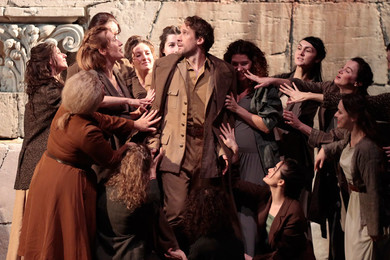Henry Purcell "Dido And Aeneas" Opera in 3 acts
| Credits |
|
Caroline de, Costume Designer Vincent Huguet, Director Bertrand Couderc, Lighting Designer Aurélie Maestre, Set Designer
|
Premiere of this production: 05 Dec 2019
Dido and Aeneas is an opera in a prologue and three acts, written by the English Baroque composer Henry Purcell with a libretto by Nahum Tate. The dates of the composition and first performance of the opera are uncertain. It was composed no later than July 1688, and had been performed at Josias Priest's girls' school in London by the end of 1689. Some scholars argue for a date of composition as early as 1683. The story is based on Book IV of Virgil's Aeneid. It recounts the love of Dido, Queen of Carthage, for the Trojan hero Aeneas, and her despair when he abandons her. A monumental work in Baroque opera, Dido and Aeneas is remembered as one of Purcell's foremost theatrical works. It was also Purcell's only true opera, as well as his only all-sung dramatic work. One of the earliest known English operas, it owes much to John Blow's Venus and Adonis, both in structure and in overall effect. The influence of Cavalli's opera Didone is also apparent. SynopsisPrologue
On the seashore, at night, one of the women of Carthage remembers how they arrived here and tells their story, since they met Dido, who kidnapped them in Cyprus to found a new Empire.
Act I
Oppressed by torments, Dido is about to welcome Aeneas, who escaped the destruction of Troy. Her right-hand Belinda, her Second Woman as well as the people of Carthage want her to marry him. She seems to resist but no longer when she finally meets him and the whole city celebrates this union.
Act II
Scene 1
Secretly, the Witch and her sisters hatch a plot for the fall of Dido and the downfall of Carthage: a spirit will come before Aeneas disguised as Mercury and order him to found a new Troy in Italy.
Scene 2
Dido and her suite take a break from hunting, while Aeneas is proud of the prey he has slaughtered. When the sky turns overcast and the thunder strikes, everyone flees back to the palace. Aeneas, left alone, is hailed by the Spirit who orders him to leave Carthage. His heart torn in two, but he ends up accepting.
Act III
In the harbour, a sailor insists that his comrades weigh the anchor and bid farewell to their lovers.
The Witch and the other sorceresses rejoice upon seeing the Trojans starting to leave and achieve their revenge against Dido.
Aeneas comes to announce to the Queen that the gods have ordered him to leave. Once he has left, Dido takes Belinda’s hand for the last time to bid her farewell, for she is henceforth going to die with one final wish “remember me, but forget my fate”.
Louis Geisler
|
|
Main Stage
1 Teatralnaya ploschad (1 Theatre Square), Moscow, Russia
New Stage
Bol'shaya Dmitrovka Street, 4/2, Moscow, Russia
|


